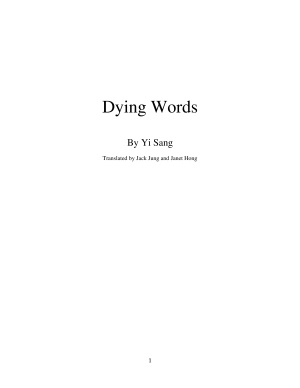Seoul: Literature Translation Institute of Korea, 2013. — 30 p.
Ли Сан. Умирающие слова (на англ. яз.)
Ли Сан (1910-1937) — корейский писатель. Печатался с 1934
(сюрреалистические стихи). В 1936 опубликовал повесть "Крылья". В
психологических повестях "Летопись жизни", "Останки ребенка",
"Утраченный рай" передал внутреннее состояние интеллигента, который
в условиях колониальной Кореи видит выход из тяжелой жизни лишь в
самоуглублении. Его произведения близки литературе "потока
сознания".
Yi Sang (1910-1937) was perhaps the most famous Korean avant-garde writer of the colonial era. In his work he experimented with language, interiority, separation from inside one's self as well as the outer world. His poems, particularly, were influenced by Weste literary concepts including Dadaism and Surrealism.
The three stories gathered in this volume display Yi Sang's inventive manipulation of autobiographical elements, a method which expands his intensely privative narratives into broader meditations on love, life, and death. "The Wings", a dark allegory of infidelity and self-deception, probes the ambiguities of perception and language through an unreliable narrator who bears an uncanny resemblance to the author himself. "Encounters and Departures", a tale of ill-fated love revolving around erotic passion and physical illness as metaphors presents a female protagonist modelled on the woman who was , in real life, the author's muse and femme fatale. Similarly, in "Deathly Child" Yi Sang offers a witty, incisive examination of sexual mores through a fictional reenactment of his ambivalent feelings toward the woman he married toward the end of his life.
Yi Sang (1910-1937) was perhaps the most famous Korean avant-garde writer of the colonial era. In his work he experimented with language, interiority, separation from inside one's self as well as the outer world. His poems, particularly, were influenced by Weste literary concepts including Dadaism and Surrealism.
The three stories gathered in this volume display Yi Sang's inventive manipulation of autobiographical elements, a method which expands his intensely privative narratives into broader meditations on love, life, and death. "The Wings", a dark allegory of infidelity and self-deception, probes the ambiguities of perception and language through an unreliable narrator who bears an uncanny resemblance to the author himself. "Encounters and Departures", a tale of ill-fated love revolving around erotic passion and physical illness as metaphors presents a female protagonist modelled on the woman who was , in real life, the author's muse and femme fatale. Similarly, in "Deathly Child" Yi Sang offers a witty, incisive examination of sexual mores through a fictional reenactment of his ambivalent feelings toward the woman he married toward the end of his life.

